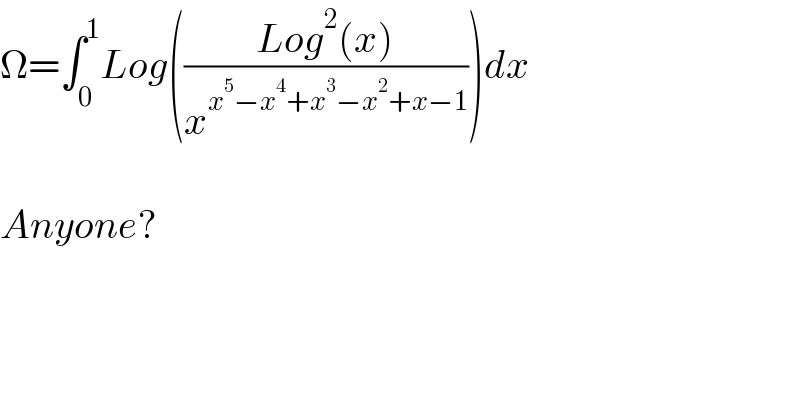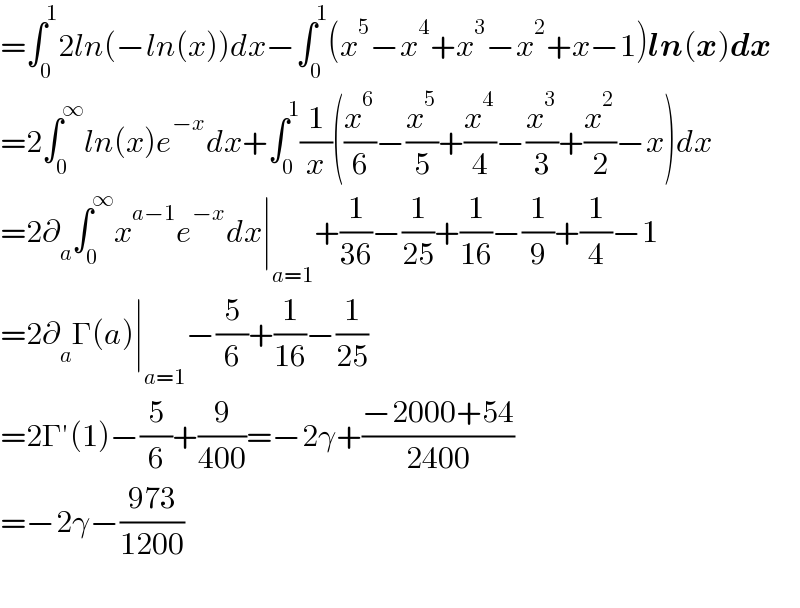
Question Number 171665 by Mastermind last updated on 19/Jun/22

$$\Omega=\int_{\mathrm{0}} ^{\mathrm{1}} {Log}\left(\frac{{Log}^{\mathrm{2}} \left({x}\right)}{{x}^{{x}^{\mathrm{5}} −{x}^{\mathrm{4}} +{x}^{\mathrm{3}} −{x}^{\mathrm{2}} +{x}−\mathrm{1}} }\right){dx} \\ $$$$ \\ $$$${Anyone}? \\ $$
Answered by mindispower last updated on 19/Jun/22

$$=\int_{\mathrm{0}} ^{\mathrm{1}} \mathrm{2}{ln}\left(−{ln}\left({x}\right)\right){dx}−\int_{\mathrm{0}} ^{\mathrm{1}} \left({x}^{\mathrm{5}} −{x}^{\mathrm{4}} +{x}^{\mathrm{3}} −{x}^{\mathrm{2}} +{x}−\mathrm{1}\right)\boldsymbol{{ln}}\left(\boldsymbol{{x}}\right)\boldsymbol{{dx}} \\ $$$$=\mathrm{2}\int_{\mathrm{0}} ^{\infty} {ln}\left({x}\right){e}^{−{x}} {dx}+\int_{\mathrm{0}} ^{\mathrm{1}} \frac{\mathrm{1}}{{x}}\left(\frac{{x}^{\mathrm{6}} }{\mathrm{6}}−\frac{{x}^{\mathrm{5}} }{\mathrm{5}}+\frac{{x}^{\mathrm{4}} }{\mathrm{4}}−\frac{{x}^{\mathrm{3}} }{\mathrm{3}}+\frac{{x}^{\mathrm{2}} }{\mathrm{2}}−{x}\right){dx} \\ $$$$=\mathrm{2}\partial_{{a}} \int_{\mathrm{0}} ^{\infty} {x}^{{a}−\mathrm{1}} {e}^{−{x}} {dx}\mid_{{a}=\mathrm{1}} +\frac{\mathrm{1}}{\mathrm{36}}−\frac{\mathrm{1}}{\mathrm{25}}+\frac{\mathrm{1}}{\mathrm{16}}−\frac{\mathrm{1}}{\mathrm{9}}+\frac{\mathrm{1}}{\mathrm{4}}−\mathrm{1} \\ $$$$=\mathrm{2}\partial_{{a}} \Gamma\left({a}\right)\mid_{{a}=\mathrm{1}} −\frac{\mathrm{5}}{\mathrm{6}}+\frac{\mathrm{1}}{\mathrm{16}}−\frac{\mathrm{1}}{\mathrm{25}} \\ $$$$=\mathrm{2}\Gamma'\left(\mathrm{1}\right)−\frac{\mathrm{5}}{\mathrm{6}}+\frac{\mathrm{9}}{\mathrm{400}}=−\mathrm{2}\gamma+\frac{−\mathrm{2000}+\mathrm{54}}{\mathrm{2400}} \\ $$$$=−\mathrm{2}\gamma−\frac{\mathrm{973}}{\mathrm{1200}} \\ $$$$ \\ $$
Commented by Mastermind last updated on 19/Jun/22

$${is}\:{this}\:{my}\:{question}? \\ $$$${if}\:{yes},\:{you}\:{did}'{nt}\:{compose}\:{it}\:{well} \\ $$
Commented by mindispower last updated on 19/Jun/22

$${ln}\left(−{ln}\left({x}\right)\right)\:{value}\:{of}\:{integral}\:{is}\:{coorect} \\ $$
